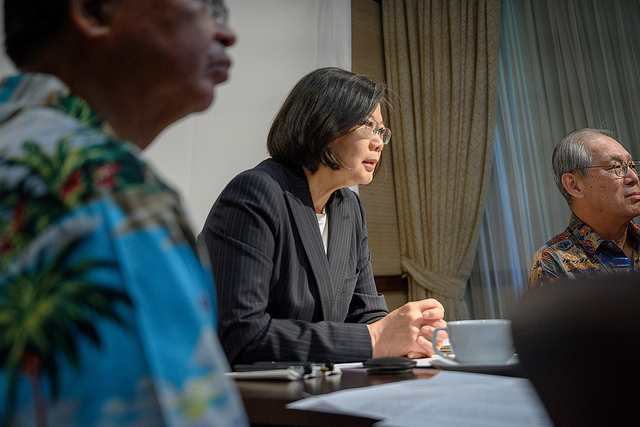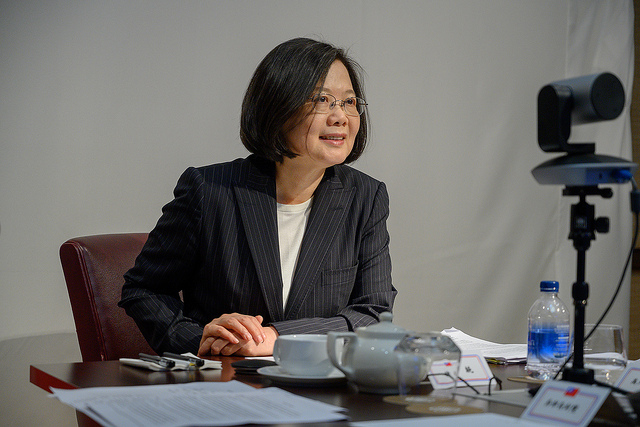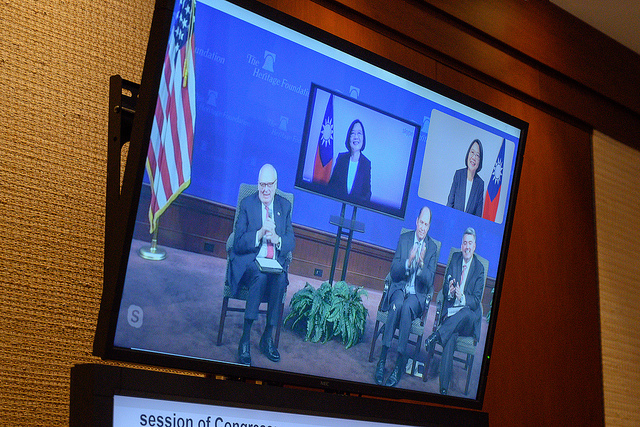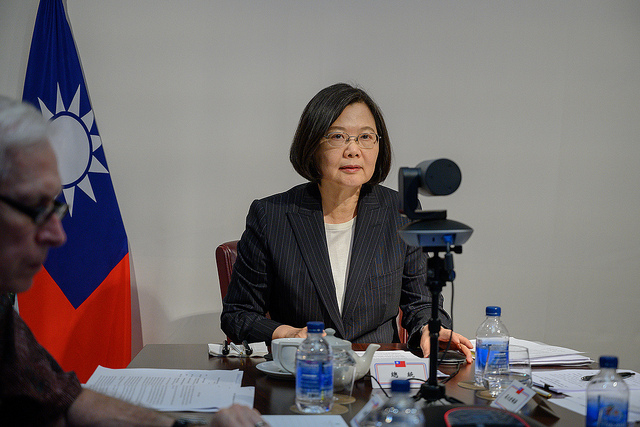News & activities
 News releases
News releases
During her series of state visits under the theme "Oceans of Democracy," President Tsai Ing-wen attended a videoconference with the Heritage Foundation, a think tank based in Washington, DC, at her hotel in Hawaii on the morning of March 27 (early morning of March 28 Taipei time).
A transcript of the president's remarks follows:
Thank you President James for your invitation and the warm introduction. And thank you to the team at Heritage, including my long-term friend Ed Feulner for holding this event. I see that Congressman Lester Wolff, a great author of the Taiwan Relations Act, is also in the audience.
Good afternoon to you all, as well as the members of the audience and media with us today.
Now, it is wonderful to be here at the Heritage Foundation, an institution that is not only at the center of politics in Washington, DC, but also instrumental to many of the policy questions that are shaping our world today. I'm joining all of you from sunny Hawaii, which being at the center of the Indo-Pacific region, could not be a more fitting location for the theme of today's event.
My transit here is the final stop of a weeklong trip that has taken me to three of Taiwan's Pacific allies – Palau, Nauru, and the Marshall Islands.
I was honored to join the President of the Marshall Islands, Hilda Heine, at the first Pacific Women Leaders' Coalition Conference. At the conference, as part of our commitment to support women leaders, including in business, we announced a new women's entrepreneurship fund for the Pacific region.
Taiwan is an integral part of the Pacific, and a proud partner to countries across the region.
The first inhabitants of Taiwan built rafts and canoes to venture from our shores in search of new islands. Today, we see traces of their language, dress, and culture evident from Southeast Asia to the Pacific Islands. The Han Chinese, Dutch, and Spanish later came as settlers and traders, eager to take advantage of Taiwan's location at the cross-roads between China, Japan, and Southeast Asia.
And even now, in the 21st century, Taiwan is still a country that is very much dependent on the blue waters of the Pacific Ocean, with an economy centered on trade, people that have grown more multicultural, and a society that is increasingly globalized.
The Pacific has much to offer Taiwan. But Taiwan also has much to offer the Pacific. Taiwan is a force for good in the region. We are a democracy, and the only democratic Chinese speaking country in the world, showing, as Vice President [Mike] Pence said: "a better path forward for all the Chinese people."
We are proud that freedom and human rights are the basis of our values. And we are determined to take the lead in improving livelihoods across the Pacific. Our technical and medical teams are working tirelessly thousands of miles from home. Our NGOs are striving to be the first responders to natural disasters. And the people of Taiwan are deeply committed to fostering a more peaceful, stable, and prosperous regional environment.
Taiwan is an ideal partner as the United States and other like-minded countries reaffirm their enduring commitment to the region. And today, I want to make clear that we are ready to play our part in ensuring that the Indo-Pacific remains free and open for generations to come.
Our approach to the Indo-Pacific centers on three core principles: democracy, regional prosperity, and collective security.
First, in terms of democracy, recent trends clearly show that like-minded countries must be much more proactive in defending democratic values, both at home and abroad.
As Ronald Reagan told the British Parliament, in defense of democracy during the waning years of the Cold War: "Optimism comes less easily today, not because democracy is less vigorous but because democracy's enemies have refined their instruments of repression. Yet optimism is in order because, day by day, democracy is proving itself to be a not-at-all fragile flower."
Today, the introduction of new tools of political and economic subversion, coupled with new forms of media disinformation, have made President Reagan's remarks truer than ever.
Taiwan is at the forefront of these challenges, which will define whether Taiwan can remain free and democratic, or will bow to the pressures of authoritarianism and control.
As a result, my administration has pledged to be much more forceful in defending Taiwan's hard won freedoms, and ensuring that our country continues to be a beacon of democracy for the Indo-Pacific. Because we know how important it is for Taiwan to continue being the light that shines directly into some of the darkest corners of the region.
Earlier this month, I laid out a seven-point plan to protect our democracy, the rule of law, and economic vibrancy amid mounting pressure from China to accept a "one country, two systems model." We are taking a much more aggressive approach to counteract the Chinese government's infiltration of our society and economy, as well as their interference in our domestic affairs.
We will also be more active in aligning ourselves with other like-minded countries that are facing similar challenges around the world.
Yesterday in Taiwan, we held a regional workshop for "Anti-Corruption in Public and Private Sectors." This event, part of the Global Cooperation and Training Framework, was notable because for the first time, it was jointly held not only with the United States, but with Japan as well.
Furthermore, last week, Taiwan and the United States announced the establishment of a new annual event called the Indo-Pacific Democratic Governance Consultations. The first meeting in September will leverage our respective strengths and shared values, to help address governance challenges facing countries in the region.
That follows another important milestone from this month, when Taiwan held the first religious freedom dialogue in the Indo-Pacific. We firmly believe in the freedom to worship, without fear or persecution, and this conference was testament to that.
We are also stepping up our engagements in the Pacific Islands, where China has engaged in a campaign to increase their influence in the region. We have noted growing awareness of China's efforts by the United States, Australia, New Zealand, and other responsible stake-holders.
Taiwan is grateful for the United States' support in keeping our diplomatic alliances. We remain committed to working with like-minded countries to protect the core values of good governance, accountability, and sustainable development in the Pacific.
Second, Taiwan, as a major trading nation, seeks to play a greater role in fostering regional prosperity through trade, investment, and respect for a rules-based economic system.
Over the past three years, we have aggressively pursued stronger economic and commercial linkages with South and Southeast Asia under our New Southbound Policy.
In 2018, our bilateral trade with countries under our New Southbound Policy reached USD$117 billion, a 6% increase from the previous year. In that same period, inbound investment has grown 43% and inbound tourism by 14%.
In India, we successfully concluded a new Bilateral Investment Agreement in December last year. And in Vietnam, Taiwanese companies are nearing the completion of a new USD$600 million petrochemical plant on the outskirts of Ho Chi Minh City.
Our New Southbound Policy has been a success, reconnecting Taiwan with the economic miracles taking place in South and Southeast Asia, the heart of the Indo-Pacific region.
We are also devoting greater efforts to address the infrastructure deficit around the region.
Taiwan was once a major recipient of aid from the United States, which helped us blossom into an economic powerhouse.
Today, we want to use our resources to play a similarly positive and constructive role.
From building new sports stadiums in the Solomon Islands and Palau, to the joint international development of new commercial projects elsewhere in the Pacific, we want to work hand-in-hand to support the national development of our regional partners.
We also seek opportunities to make sustainable investments in infrastructure, energy, digital economy, agriculture, and public health under our USD$3.5 billion assistance project. That is the Official Development Assistance (ODA) program. And we are partnering with the US Overseas Private Investment Corporation (OPIC), which was featured by President Trump's BUILD Act, to identify possibilities in the region.
In terms of trade, Taiwan is determined to lead by example. This is important, especially because the United States and the European Union are demanding that countries do more to protect trade secrets, intellectual property, and maintain a free and fair trading system.
This year, the Heritage Foundation ranked Taiwan as a top ten country in their Index of Economic Freedom, citing our achievements in enhancing the rule of law, regulatory efficiency, and open markets. I know because Ed personally presented me with a copy in January.
This helps bolster our case as we seek to join high-standard regional trading blocs, such as the CPTPP (Comprehensive and Progressive Agreement for Trans-Pacific Partnership), that will shape the future of trade in the Indo-Pacific region. As I have mentioned in the past, leaving Taiwan out not only means that a key trading regional partner will be absent. It will also create a gap in the global high-tech supply chain, where Taiwan plays an essential role.
Third, Taiwan is committed to strengthening the sense of collective security across the Indo-Pacific region.
Taiwan continues to face monumental challenges from across the Taiwan Strait. My administration has not wavered in responding in a pragmatic and responsible manner that takes into account our shared interests in the region.
We have continued to seek co-existence instead of confrontation, and reconciliation instead of conflict. We have sought balance in the cross-strait relationship, in terms of our rhetoric and our actions, in order to maintain the status quo underpinning peace and stability in the Taiwan Strait.
But despite our best intentions, China has used every opportunity to alter the status quo. They have continued to undermine our democratic institutions, heighten military tensions, and degrade our international space. This has led to growing distrust by the people of Taiwan, posing an underlying challenge to the future of cross-strait relations.
China's actions have underscored the need for Taiwan to increase our self-defense and deterrence capabilities. To be clear, we seek peace, not hostility. But we must be capable of defending our freedom, democracy, and way of life. This is my fundamental responsibility as president of the country.
Fortunately, in facing these challenges, Taiwan does not stand alone. The United States commitment to Taiwan is stronger than ever.
We will continue to seek closer partnerships with like-minded countries so that we can fulfil the promise of the Indo-Pacific strategy. That is the idea that by supporting one another, countries can remain free and sovereign, without being subject to coercion.
As a democratic country with a bastion of authoritarianism on our doorstep, we believe that Taiwan's security is a matter of collective security, and that Taiwan's future remains closely tied with the future of this region as a whole.
Taiwan's home is the Indo-Pacific. And our vision for the Indo-Pacific is clear. It is rooted in our shared desire to sustain the rules-based framework that has been at the heart of this region's prosperity since the Second World War. We believe any effort to challennge that framework would be a fundamental mistake.
We stand ready, and will work closely with any and all countries that share this view.
Taiwan has a lot to contribute, in terms of advancing democracy, regional prosperity, and collective security.
We will continue to work in the common interests of all like-minded partners in the region. And we are committed to ensuring that the Indo-Pacific remains free and open for generations to come.
Thank you.
Heritage Foundation President Kay Coles James presided over the videoconference. The participants included Heritage Foundation founder Dr. Ed Feulner, US Senator Cory Gardner, Congressman Ted Yoho, and former Congressman Lester Wolff.
President Tsai attends videoconference with US Heritage Foundation (Q&A_Full version)






